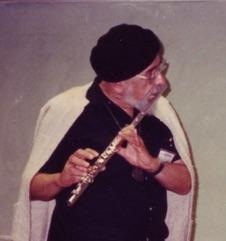
Jewish Humanist neighbors, newly aware of this Omer blog, upon learning Day Ten is Tiferet sheh b'gevurah--"Harmony wrapped in discernment" insisted upon taking us to see the movie Seymour at the local art cinema. It is beautifull and truly a fit for this day's pair of sephirot. If you have the opportunity, do go see it. As the trailer moves along it shows some of the remarkable spiritual perceptivity of Seymour Bernstein (concert pianist, composer, master teacher) that is conveyed throughout the film: https://youtu.be/oCOM3wMqoHg
In the movie Seymour, there scenes with him mentoring students, from his concerts and from his life...also footage of him teaching master classes. Have you read Reb Zalman's book on Davening: A Meaningful Guide to Jewish Prayer? In it he speaks of the importance of being mentored in prayer by someone who fills with light and spirit, by a m'kubal (same root word as Kabbalah). Reb Zalman speaks of the obligation of such individuals to be available to mentor. Watching Seymour give his master class, his lovingkindness is balanced with a divine firmness.
In our Maggid-Educator Jewish Spiritual Education (SM) program, [we are fully enrolled at present], master classes begin next semester with Peninnah Schram and Cherie Karo Schwartz. Seymour depicts how it's such a tender thing to guide a soul, regardless of the subject matter. Connection to Source is vital and this is something Seymour Bernstein's students appear to have, too.
Oh! To have been blessed with even a fraction of such an awesome piano teacher as a youth! And yet! Having been blessed with an awesome davening mentor, I now wonder how Reb Zalman learned to play piano and flute? One day I asked his help in praying Tachanun, prayers of supplication in the setting of a Tuesday morning service at a conference. First, without saying a word--he went to over to his piano and played a Tachanun-like spontaneous expression ever so passionately, then on the flute with a more poignant version.
Then Reb Zalman came over to me, wrapping his tallit around both of our shoulders while together, we held the siddur, prayerbook, open to Tahanun. Ever so softly Reb Zalman began praying the text while bowing over and resting his head upon the top of his left hand and eventually weeping. This time, instead of my usual alienation from the archaic terms, I found the letters and words functioning as though they were actually musical notes and all of creation was pleading with us in a personal audience with the Source of Life. Mirroring his movement, (traditionally meant to echo of Moses, Aaron and Joshua falling on their faces when experiencing Presence), an response arose within: the quality of being Unconditionally Loved (chessed) and Held Accountable (gevurah)in equal measure. My cheeks damp with tears upon emerging from the harmony of Tiferet.
Over lunch Reb Zalman pointed out how important it is to pray with a siddur "or the letters can't offer you their music. It's also important to enter true humility--that comes from knowing we don't merit bupkes. [not a thing] [The root of Tahanun is heyn--grace.] We only got down to business with the sidd'r."
I'll never forget that third time, it changed my relationship to Tahanun and tefillah--prayer, forever.
Thank you Reb Zalman.
This was Omer Day 10. I've created and posted a full, downloadable 2015 Omer chart here.